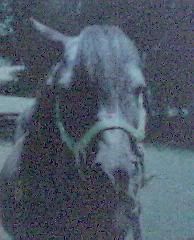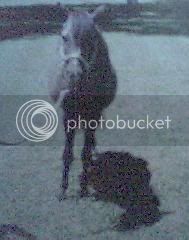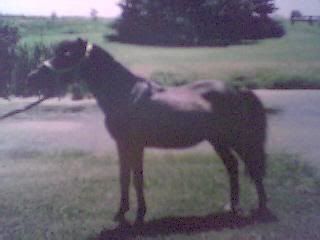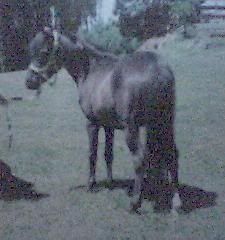Hello Miss Desiree,
I do not critique either and I could not also see your pictures if I did.
I can tell you that I have shown many older and ageing horses. Although exhibiting an ageing horse will find it difficult to compete against younger horses, it can be done successfully too if you are very careful about it learn about the extra special care that an ageing horse requires. I know that you love your Midnight, but he does need more than just your love. He needs you to become knowledgeable on geriatric care considering his age. So I would like to suggest to you that you do a Google search and begin to educated yourself on things you can do to help Midnight thrive in his Golden Years.
The other thing I would suggest to you is to ask the judge at the show for his/her opinion after your class is over. I am sure the judge can shed some more light on things for you that you may not be considering. Most judges are happy to do that.
Furthermore I do believe that a good outward appearance starts from within, so before you subject your horse to the stress and riggers of a horse show, (espeically in the heat) I suggest that you have your vet do a good exam on him first.
Here is one short article that I have selected for you to get a jump start on your research. Please pay attention to it.
Good luck and best wishes to you.
The older horse
It is not only humans that are living longer, our horses are too!. Improvements in diet, management and veterinary care mean that horses and ponies can easily live into their 20s and 30s. The average age for a horse is about 24 years. Just like young animals, older animals need special care to keep them happy and healthy. Here’s some good advice on how to care for your ageing horse.
When is a horse ‘old’?
For young horses, one year is equal to about 3.5 years of a human’s life. So, a 10-year-old horse is equivalent to a 35-year-old human. The ratio changes slightly as horses get older, when one year is equal to about 3 human years: so a 20-year-old horse is equal to a 60-year-old human. A horse is considered to be old or ‘geriatric’ when it has reached 20 years of age, but many horses are still physically fit when they reach
this age.
Are there any signs of ageing?
Older horses may show the following changes:
Appearance:
Sagging topline resulting in a ‘sway’ or dipped back with prominent withers
Sagging skin and muscle degeneration
Characteristic drooping lower lip
Cataract development
Face has a hollowed appearance with deepening depressions above the eyes
Like humans, grey hairs will appear - these will be especially noticeable around the eyes, ears, forehead and muzzle
Other signs:
Messy eating habits, difficulty eating or loss of appetite - the result of worn/missing teeth
Lameness due to arthritis.
Weight loss
Why do older horses need more care?
We can see from the outward signs of ageing that a horse is getting old, but changes are happening inside the body too:
The heart, liver, kidneys, digestive tract and immune system become less efficient
Bones become brittle
Muscles may become weaker and the joints and tendons lose their elasticity
Hormonal changes can adversely affect body condition
These effects of ageing mean that your horse is more susceptible to illness and that recovery from disease or injury will be slower.
What special care do I need to provide?
Dental - now that your horse is getting older it is advisable that your horse has his teeth checked twice a year or at any time that you notice a problem such as weight loss or difficulty chewing. If your horse has had regular dental treatment throughout his life, it is far more likely that his teeth will be in working order when he is approaching his thirties.
Nutritional - proper nutrition is essential to a healthy, older horse. Their digestive system becomes less efficient in addition to hormonal and metabolic changes that affect their digestion and absorption of the essential nutrients needed.
A diet for an older horse should be:
Highly palatable
Easy to chew and swallow
Dust free
High in protein and fibre
Provide essential vitamins and minerals
High in energy
Easy to digest
Before changing your horse’s diet, consult your vet, he will probably want to do some tests to check for any kidney or liver problems. If you do need to change your horse’s diet, make sure you do it over a period of 7-10 days, unexpected changes can disrupt the digestive system. Continue to supply lots of water, if your horse isn’t getting enough he may develop colic or start to suffer from constipation. If you do find it difficult to persuade your horse to drink plenty of water you may need to provide water-soaked feeds or mashes.
General care - sensible management of your older horse is essential to his general well-being. Don’t forget the routine care that he has had throughout his earlier years:
Routine worming and vaccinations are more important than ever
Provision of shelter and warm stabling in the winter
Regular twice-daily checks to keep an eye on changes in body condition, injuries, etc
Give your horse adequate exercise to maintain muscle tone, flexibility and mobility. Just because your horse is getting old doesn’t mean he won’t need regular exercise. You may want to consult your vet if you are unsure.
Caring for your horse’s feet is also very important. If your horse is still shod he will need to see the farrier every 5-8 weeks or as necessary. Even if your horse doesn’t wear shoes, he will still need to have his feet trimmed and checked regularly.
If all of these points are followed, there is no reason why your older horse should not continue to live his life as he did when he was a younger animal.
What specific problems might my horse develop in later life?
Arthritis - this affects one or more of your horse’s joints and is very common to the older horse. Signs include stiffness or lameness - this usually improves with exercise. Arthritis is usually worsened by cold, damp weather, and once present will not go away. The condition, however, can be controlled. Horses can continue to work on a low dose of painkiller. Other options include herbal remedies and copper bands. The welfare of your horse must always be considered, if your horse is not happy and is not able to live a contented life, then euthanasia might be an option.
Dental - as your horse gets older his teeth will continue to grow, even so, the rate of wear is often faster than any new growth. Problems include worn down cheek teeth resulting in inability to chew food properly. Sharp edges or points may develop causing pain on chewing, reduced food intake infection. Loose teeth are also a common problem, this is usually due to an infection and the tooth will probably have to be removed. Due to no fault of your own, your horse may have no teeth at all - do NOT panic - in this situation your horse’s diet will have to be changed substantially, but it is unlikely that it should make any difference to his health or general well-being.
Liver and kidney - degeneration of the liver and kidney is more common in
the older horse. This reduces the ability of the organs to function
properly. Possible signs will include weight loss and loss of appetite. If
your horse suffers from either of these problems, it may require diet
changes. If your horse develops a more severe problem he might start to
behave differently - he will become irritable, start circling and
headpressing. Liver and kidney degeneration are problems that must be seen
by your vet. Your vet will discuss the possibilities and the management of
it with you.
Pituitary / thyroid dysfunction - pituitary (glands at the base of the brain that help to control growth) dysfunction include the following signs:
Chronic laminitis
Failure to shed coat (Cushing’s Disease)
Increase in water intake
Increase in urination
Thyroid (gland in the neck that helps to control body growth) dysfunction
include both low (‘hypo’) and high (‘hyper’) thyroid production
Fatigue
Signs of excessive thyroid production include:
Heart beat irregularities
Increase in water intake
Restlessness
Weight loss despite increased appetite
Pituitary and thyroid dysfunction are problems that must be seen by your vet. Your vet will discuss the possibilities and the management of it with you.
Reproductive - this function also declines slowly as your horse gets older. A reduction in hormone efficiency will lead to infertility in both mares and stallions. Geldings can also suffer from infections and swelling in the sheath leading to difficulty urinating. Regular hygiene is important to help keep bacteria and abnormal fluid accumulation at bay.
Tumours - ageing may be associated with an increased incidence of some types of tumours but the relationship of age and tumour occurence is much less clear than in the human. Tumours are quite rare in the horse other than sarcoids and melanomas. Sarcoids are wart-like masses that occur most commonly on the lower legs but can occur on any part of the body. Melanomas are tumours common in the skin, eye and oral cavity which are commonly seen in aged grey horses.
What if my horse is just too old?
There comes a time for every horse when things just get too much. As responsible horse owners, we need to make sure that our horses have the best treatment possible but if the time comes when the accumulation of years of wear and tear and general old age become too much, euthanasia is the kindest thing for a horse who is no longer able to have the quality of life he has always been used to.
423066[/snapback]

























